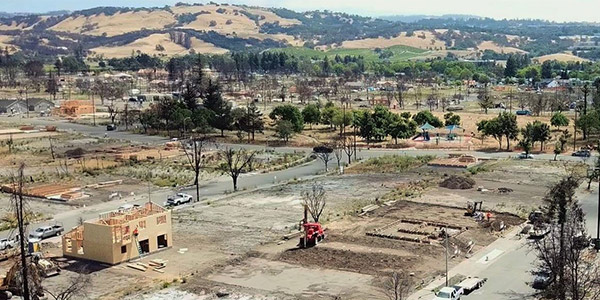By Hudson Sangree
PG&E Corp. announced Friday it had reached an $11 billion settlement agreement with nearly all the insurers trying to recoup their payments to victims of wildfires sparked by the utility’s equipment in the past two years.
The insurers — collectively known as the Ad Hoc Subrogation Group — were the second largest bloc financially, after wildfire victims, that PG&E had to confront in its Chapter 11 reorganization proceedings begun in January.
The agreement must be approved by the bankruptcy court, along with other settlement offers by PG&E. The company had already agreed in June to settle claims by local governments and agencies against it for $1 billion.
“Today’s settlement is another step in doing what’s right for the communities, businesses and individuals affected by the devastating wildfires” of 2017 and 2018, PG&E CEO Bill Johnson said in a news release.
PG&E is attempting to exit bankruptcy by June 2020 to be able to take advantage of a new $21 billion wildfire recovery fund established by the state of California to compensate fire victims. The fund was created by Assembly Bill 1054, passed in July. (See Calif. Wildfire Relief Bill Signed After Quick Passage.)
It’s also trying to head off what’s essentially a hostile takeover attempt by its unsecured bondholders, which have offered PG&E a $30 billion cash infusion in exchange for a controlling interest in the utility and guaranteed payment of their notes. (See Judge Weighs Competing PG&E Bankruptcy Plans.)
In a separate statement, the Subrogation Group said it was accepting a settlement that’s a little more than half of what insurers claim they’re owed.
“While this proposed settlement does not fully satisfy the approximately $20 billion in group members’ unsecured claims, we hope that this compromise will pave the way for a plan of reorganization that allows PG&E to fairly compensate all victims and emerge from Chapter 11 by the June 2020 legislative deadline,” it said.
The deal PG&E struck with insurers is $2.5 billion more than the trust, capped at $8.5 billion, that PG&E proposed in its reorganization plan filed Sept. 9. In that plan, $16.9 billion was to be split about equally between individual wildfire victims and insurance companies. (See PG&E Offers $16.9B for Wildfire Claims in Chap. 11 Filing.)
Whether the increase for insurers means wildfire victims could get less will be determined in court, but victims’ lawyers had already criticized PG&E’s initial plan of compensation as falling far short of what they deemed acceptable.
PG&E filed a document Friday with the U.S. Securities and Exchange Commission showing it had secured promises of $14 billion in new equity investment to help cover its wildfire payment plan. It also said it was increasing its total compensation package for victims, insurers and local governments by $1 billion — still $1.5 billion short of Friday’s proposed increase for the subrogation claimants.
PG&E filed for bankruptcy in January, saying it couldn’t afford at least $30 billion in wildfire claims from a series of deadly and hugely destructive fires in 2017 and 2018.
Investigators with the California Department of Forestry and Fire Protection (Cal Fire) said PG&E equipment sparked November’s Camp Fire, the deadliest and most destructive in state history, and a rash of fires in Northern California wine country in October 2017.
Cal Fire determined a private landowner’s faulty wiring started the Tubbs Fire, which leveled part of the city of Santa Rosa, killed 22 people and caused billions of dollars in damages in October 2017. But Judge Dennis Montali, of the U.S. Bankruptcy Court in San Francisco, allowed fire victims and insurers to move ahead with lawsuits in state court that blame PG&E for the Tubbs Fire.
Friday’s settlement includes the Tubbs Fire, a PG&E spokeswoman said, though the lawsuit remains active for now, pending the bankruptcy court’s approval of the settlement.
PG&E’s beleaguered stock price rose nearly 11% after Friday morning’s announcement, going from $10.10/share at close of trading Thursday to $11.18/share by 4 p.m. Friday.




